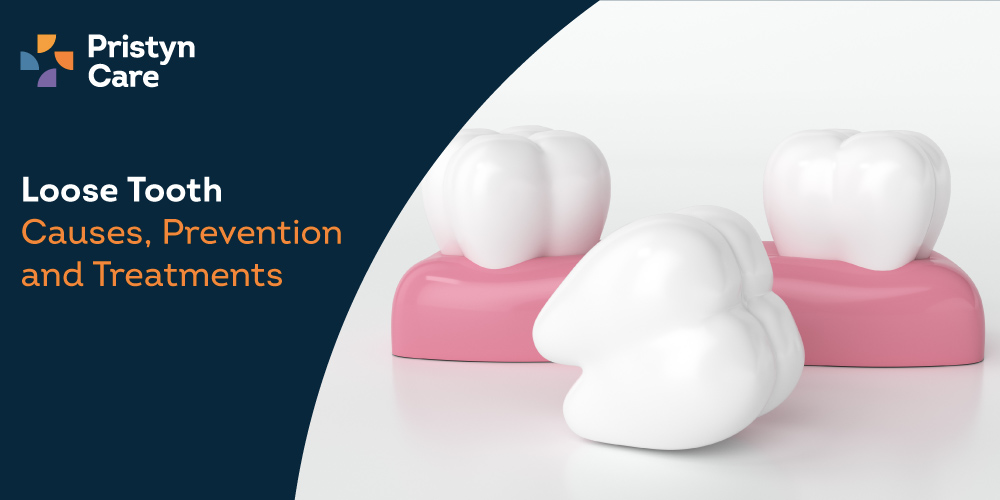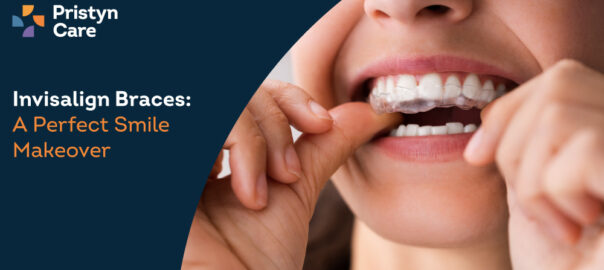![]() Views: 3,782
Views: 3,782
Loose Teeth – Causes, Treatment and Prevention
However, loose teeth in adults may indicate underlying dental issues, such as gum disease or dental trauma, and should be addressed promptly by a dentist to prevent further complications.
Dedicated Support at Every Step!
Our Doctors are available 24 hours a day, 7 days a week to help you!
In this article, we will explore the reasons behind loose teeth and provide practical tips for promoting dental well-being
Table of Contents
Common Causes of Loose Tooth
Loose teeth can be a common problem for many people, and there are several reasons why this may occur. Here are some common causes of loose teeth:
- Gum disease: This is the most common cause of loose teeth that affects the tissues that support and hold the teeth in place.
- Trauma or injury to the mouth: Any injury or trauma to the mouth or face can cause a tooth to loosen.
- Bruxism: The habit of grinding or clenching the teeth can put excessive pressure on them, causing the loosening of the teeth.
- Osteoporosis: This condition weakens the bones, including those in the jaw, making them more susceptible to tooth loss.
- Poor Oral hygiene: Failing to brush and floss regularly can lead to tooth decay and gum disease, which can cause loosening of the teeth. Always follow proper oral hygiene practices.
- Malocclusion: Misaligned teeth can put uneven pressure on the jaw, leading to loose teeth.
- Tobacco: Tobacco use can damage the gums and cause them to recede, leading to loose teeth.
- Nutritional deficiencies: A lack of essential vitamins and minerals can affect bone density and lead to tooth loss.
- Age: As we get older, the tissues that support the teeth can weaken, increasing the risk of loose teeth.
- Genetics: Some people may be more prone to gum disease and tooth loss due to their genes.
- Alcohol consumption: Excessive alcohol consumption can lead to dehydration, which can affect the health of the gums and lead to tooth loss.
- Acid reflux: The acid from the stomach can cause erosion of the enamel on the teeth, leading to tooth decay and gum disease.
- Stress: Excessive stress can weaken the immune system and make the gums more susceptible to disease, which may lead to loosening of the teeth.
Home Remedies to Strengthen Loose Tooth
Having a loose tooth can be a cause of concern as it can affect your ability to eat or drink. If you are looking for natural ways to strengthen your loose tooth, here are a few home remedies that could be beneficial for you. Here’s a list of home remedies that can help you strengthen your loose tooth.
- Oil Pulling: This is an ancient technique that involves swishing oil in your mouth for about 20 minutes. Coconut oil, sesame oil, and sunflower oil are some of the oils that can be used for oil pulling.
- Saltwater Rinse: A solution of warm salt water can help reduce inflammation and pain associated with a loose tooth. Rinse your mouth with salt water for 30 seconds, then spit it out. Repeat this process for 2-3 times a day.
- Garlic: Garlic has antimicrobial properties that can help combat tooth decay and gum disease. Chew a garlic clove for a few minutes daily.
- Turmeric: Turmeric has anti-inflammatory properties that can help reduce inflammation in the gums. Mix turmeric powder with water to create a paste and apply it to your gums.
- Clove Oil: Clove oil has analgesic and anti-inflammatory properties that can help alleviate pain and inflammation associated with a loose tooth. Apply clove oil to your gums with a cotton swab.
- Guava Leaves: Guava leaves contain antimicrobial properties that can help fight off harmful bacteria in the mouth. Boil guava leaves in water, let it cool, and use it as a mouthwash.
- Licorice Root: Licorice root contains antibacterial properties that can help prevent tooth decay and gum disease. Chew on a piece of licorice root for a few minutes.
- Wheatgrass Juice: Wheatgrass juice contains antioxidants that can help prevent tooth decay and gum disease. Swish wheatgrass juice in your mouth for a few minutes and then spit it out.
- Aloe Vera: Aloe vera has anti-inflammatory properties that can help reduce inflammation in the gums. Apply aloe vera gel to your gums.
- Baking Soda: Baking soda can help neutralize the acids in the mouth that can cause tooth decay. Mix baking soda with water to create a paste and brush your teeth with it.
- Sesame Seeds: Sesame seeds contain calcium that can help strengthen teeth. Chew on a handful of sesame seeds daily.
- Vitamin D: Vitamin D is essential for strong bones and teeth. Make sure to get enough vitamin D through sunlight exposure or by taking a supplement.
- Vitamin C: Vitamin C can help boost the immune system and prevent gum disease. Eat foods high in vitamin C, such as citrus fruits, strawberries, and kiwi.
- Vitamin K2: Vitamin K2 is essential for strong bones and teeth. Eat foods high in vitamin K2, such as natto, cheese, and egg yolks.
- Magnesium: Magnesium is essential for strong bones and teeth. Eat foods high in magnesium, such as spinach, almonds, and dark chocolate.
- Calcium: Calcium is essential for strong bones and teeth. Eat foods high in calcium, such as dairy products, leafy greens, and almonds.
- Zinc: Zinc can help prevent tooth decay and gum disease. Eat foods high in zinc, such as oysters, beef, and pumpkin seeds.
- Iron: Iron is essential for strong bones and teeth. Eat foods high in iron, such as red meat, spinach, and lentils.
- Fennel Seeds: Fennel seeds can help freshen your breath and prevent gum disease. Chew on a handful of fennel seeds daily.
- Green Tea: Green tea contains antioxidants that can help prevent tooth decay and gum disease. Drink green tea daily.
There are several home remedies that can help strengthen a loose tooth. It is important to maintain good oral hygiene and eat a balanced diet to prevent tooth decay and gum disease. If your loose tooth persists, it is important to consult a dentist for further evaluation and treatment.
Treatment for Loose Tooth
Here are some basic treatment options to strengthen loose teeth. Depending on the severity of the condition, the dentist may suggest:
- Flap surgery: Flap surgery is a dental procedure used to treat loose teeth. It involves lifting the gum tissue to access the underlying bone and tooth roots. The dentist then cleans the area, removes any infected tissue, and repositions the gum tissue to promote healing. Flap surgery can help stabilize loose teeth and prevent further damage.
- Bone grafting: If your bones in the mouth are getting weaker, the doctor can do something to fix them. They might take small pieces of bone from another part of your body or use a special material called bone grafting. This helps to repair the damaged bone in your mouth and gives support to your teeth.
- Splinting: If your loose tooth is still attached to your gums, the doctor can try to save it. They use a special device called a splint. It's like a piece of metal that connects the loose tooth to the nearby teeth. This gives the loose tooth extra support and stops it from moving around.
- Mouth guard: If you grind your teeth, you can try wearing something called a night guard while you sleep. It's like a protective barrier that goes between your top and bottom teeth. This helps to prevent damage caused by grinding.
Prevention Tips for Loose Tooth
A loose tooth can be uncomfortable and concerning, but there are steps you can take to prevent it from happening. By following these prevention tips, you can maintain strong and healthy teeth.
- Maintain good oral hygiene by brushing your teeth twice a day with fluoride toothpaste.
- Use a soft-bristled toothbrush to avoid damaging your teeth and gums.
- Floss your teeth at least once a day to remove food particles and plaque.
- Avoid eating hard and sticky foods that can damage your teeth and gums.
- Wear a mouthguard while playing sports or engaging in physical activities such as boxing to protect your teeth.
- Don't use your teeth to open bottles or tear packaging.
- Quit smoking and using tobacco products, as they can weaken your gums and teeth.
- Limit sugary, acidic foods and drinks that can erode your tooth enamel.
- Drink plenty of water to keep your mouth hydrated and wash away food particles.
- Chew sugar-free gum to stimulate saliva production, which can help neutralize harmful acids in your mouth.
- Visit your dentist regularly for check-ups and cleanings.
- Talk to your dentist about fluoride treatments or dental sealants to strengthen your teeth.
- Treat any dental issues promptly, such as cavities, gum disease, or cracked teeth.
- Avoid grinding or clenching your teeth, as it can lead to tooth trauma and loosening of the teeth.
- Use a straw when drinking sugary or acidic beverages to minimize contact with your teeth.
- Practice relaxation techniques, such as deep breathing or meditation, to reduce the stress that can contribute to teeth grinding and clenching.
- Get enough calcium and vitamin D in your diet to maintain strong and healthy teeth.
- Consider using a water flosser or interdental brush to clean between teeth and prevent plaque buildup.
By following these prevention tips, you can reduce the risk of loose teeth and maintain good oral health. But it is important to consult a dentist if you have any concerns or questions about your dental health.
Conclusion
Dealing with a loose tooth can be both annoying and discomforting. It is important to be patient and avoid forcefully pulling the tooth. Instead, consult your dentist and try to find out the root cause of the loose tooth and get the appropriate treatment.








